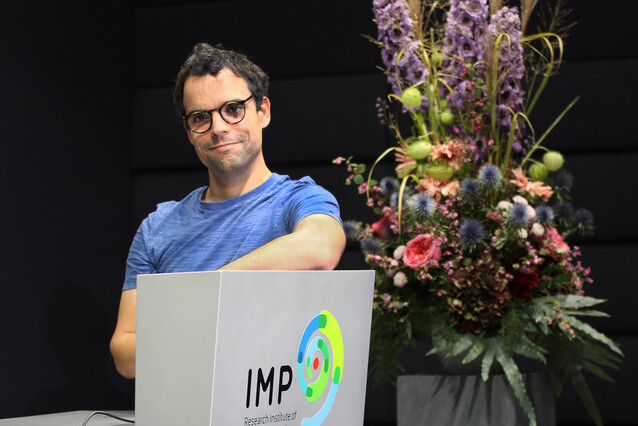Teamwork makes the gene work: how enhancers collaborate to control gene expression
Enhancers play a crucial role in controlling gene expression. These genomic DNA elements interact with transcription factors and can work independently or in concert, to regulate gene transcription. In a study published in Nature Communications, Vincent Loubiere, postdoc in the lab of Alexander Stark, investigated the mechanisms underlying enhancer-enhancer cooperativity using the fruit fly Drosophila melanogaster as a model organism. In this interview, Loubiere discusses his findings, the challenges faced during the research, and the future directions of this field of study.
Which were the key questions at the start of your research on enhancers and their functions in gene regulation?
Although enhancers have been extensively studied in isolation, a substantial number of genes have more than one simultaneously active enhancer, and it remains unclear how these cooperate to regulate transcription. In this study, we explored the mechanisms of enhancer-enhancer cooperativity in Drosophila, where housekeeping and developmental enhancers recruit very distinct sets of transcription factors and co-factors to drive the transcription of ubiquitously expressed and tissue-specific genes, respectively.
What did you find?
We found that housekeeping enhancers act additively, meaning their combined activity equals the sum of each enhancer’s individual activity. In contrast, developmental enhancers are super-additive, and combine multiplicatively until saturating the promoter. Importantly, this super-additivity does not strictly require specific transcription factor motifs and is rather promiscuous, though it can be boosted by Trl and Twist motifs.
What are the implications of your observations?
Our results may help us interpret the functional impact of non-coding mutations, by reconciling seemingly paradoxical observations: while mutations affecting super-additive enhancers may significantly decrease the transcription of cognate gene, this will only happen if the remaining enhancers are not sufficient to saturate its promoter. Interestingly, we also found that developmental transcription factors and co-factors contain a higher fraction of intrinsically disordered regions compared to housekeeping ones, which may drive their super-additive interactions.
What challenges did you have to overcome to get to your findings?
To understand the rules behind enhancer cooperativity, the main challenge was to develop a method to simultaneously measure the activity of many individual enhancers as well as all corresponding pairwise combinations. Then, I had to establish a dedicated computational pipeline to analyse this original dataset and infer the most relevant parameters.
How did you do this?
I designed a fusion-PCR-based strategy to systematically pair candidate sequences, and I optimised a variant of theSTARR-seq assay to measure their activity in Drosophila cells. This way, we tested more than 1,000 individual enhancers and one million enhancer pairs downstream of a developmental and a housekeeping promoter. Then, I used modelling approaches to assess the relevance of various models that had been previously proposed, as well as the respective contribution of various DNA binding motifs.
What’s next?
Well, we still have many questions to address. Moving forward, we want to know how promoter saturation constraints enhancer cooperativity and explore how this influences transcription at complex loci. We also want to look at the role of intrinsically disordered regions (IDRs) in transcription factors and co-factors in driving super-additive interactions. Testing the relevance of our findings in mammals is also on the list, as well as understanding chromatin’s role in fine-tuning enhancer cooperativity in situ.
Original publication
Vincent Loubiere, Bernardo P. de Almeida, Michaela Pagani, Alexander Stark. "Developmental and housekeeping transcriptional programs display distinct modes of enhancer-enhancer cooperativity in Drosophila." Nature Communications, DOI: 10.1038/s41467-024-52921-2.
Further reading
